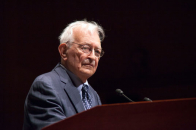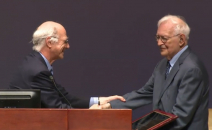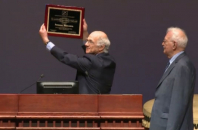ABOUT ISA
Immanuel Wallerstein Award Ceremony 2014
ISA Award for Excellence in Research and Practice for Immanuel Wallerstein, Yale University, USA, ISA President 1994-98
Award ceremony at ISA World Congress of Sociology, Yokohama, Japan, 2014
Announcement of the Award
by Michael Burawoy, ISA President 2010-14
I’m pleased to announce the first recipient of the ISA’s new and only, association-wide award, the award for excellence in sociological research and practice. The award was widely advertised to encourage the broadest possible nominations from ISA members. From among a number of impressive candidates, the 7-person committee drawn from the ISA Executive Committee chose Immanuel Wallerstein as the first recipient.
The award committee received an impressive set of supporting documents testifying that among living sociologists no one has exercised more influence on the social sciences than Immanuel Wallerstein. His contributions to social science go well beyond producing a 50-year series of exceptional award-winning books and articles too numerous to count. Indeed, he is one of those very rare scholars whose work has been paradigm shifting.
Having started out in the 1960s analyzing colonialism and national liberation struggles in Africa, he turned to the broadest possible intellectual project, the analysis of the emergence and subsequent dynamics of the “modern world-system,” carefully grounding his theoretical enterprise in deep and detailed historical scholarship. Beginning in 1974 with the first volume of his Modern World-System (of which three further volumes appeared in 1980, 1989 and 2011) his approach revitalized sociology as a comparative historical enterprise, bringing it back to classic concerns with long term change. His world-systems framework continues to be a thriving area of social science, attracting some of its best minds.
As he rewrote the history of the world he came to reflect and analyse the peculiar provincialism of Western Social Science, not least its segmentation into artificial disciplines. His view on the reconstruction of the social sciences came to be widely known with the acclaimed publication of Open the Social Sciences, the 1995 report of the Gulbenkian Commission that he chaired. Since then he has been the author of many volumes on the history and future of the social sciences.
Wallerstein is not just an intellectual giant. He has also been a genuine servant of sociology as a global discipline, traveling tirelessly around the world and serving in a multitude of organizational roles. As President of the International Sociological Association (1994-98), he created a receptive space in the global arena for scholars from all over the world but particularly from the Global South, from Latin America, from Africa, from Asia and from the Middle East. He cultivated and inspired a new generation of leaders of the ISA and of world sociology. The committee considered there to be no more worthy winner of the first Award for Excellence and Practice of Sociology than Professor Immanuel Wallerstein.
Please come up and receive your award.
Acceptance Speech
by Immanuel Wallerstein
I would first of all myself like to congratulate the Executive Committee of the ISA for having created this award. I don’t know if everyone realizes how unusual that is.
There is probably no scholarly association in any field, whether international, national or local, that does not have some kind of award for excellence in research. And some of them also have an award for excellence in practice, although many of them define practice in a very narrow way. But this is probably the first association, scholarly or scientific, that has actually created an award in excellence in research and practice. And it sends a message.
The message, it seems to me, is that the attempt to create an artificial separation between two pillars of scientific activity (research and practice) is a vain one. There are many, many, many people in all fields who deny that they are engaged in practice either research. And furthermore consider it improper or, in a stronger language than that, impermissible, that scholars actually engage in practice.
But of course the denial just covers up the fact which they themselves may not realize that they are accepting the legitimacy of the practice of some major dominant group in their field, in their world, etc. So while scholarship research is one thing and practice is another thing, we all engage in both of them. And every time we write, every time we create a research project, every time we engage in practice, we are engaging in a mutual interrelated set of activities which is that of the scholarly world.
So I congratulate the Executive Committee for having created this award and of course I’m extremely honored that they chose me as its first recipient.
Thank you.



